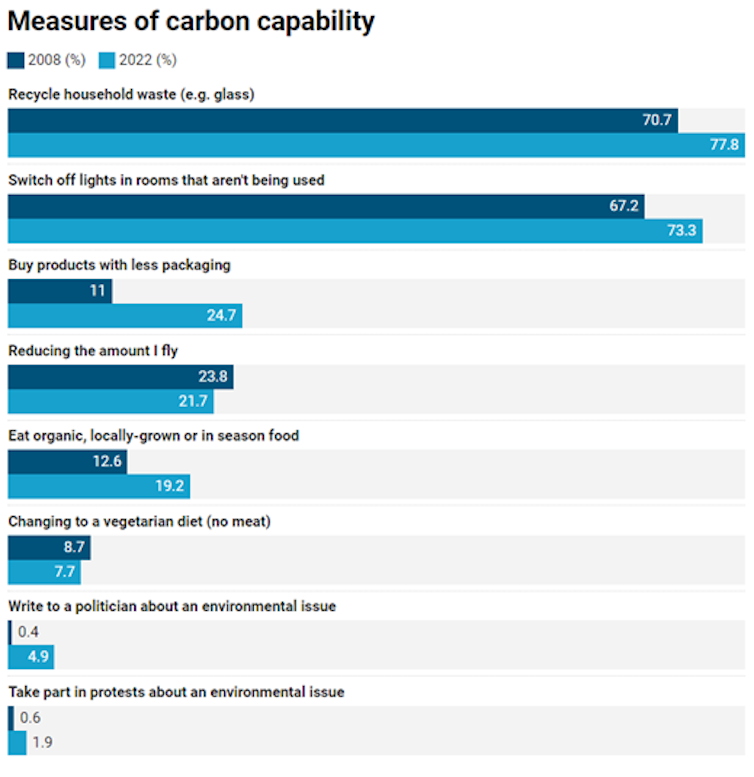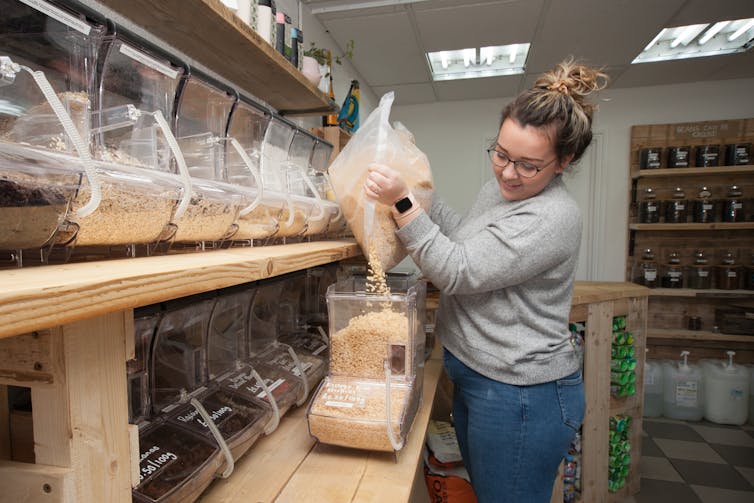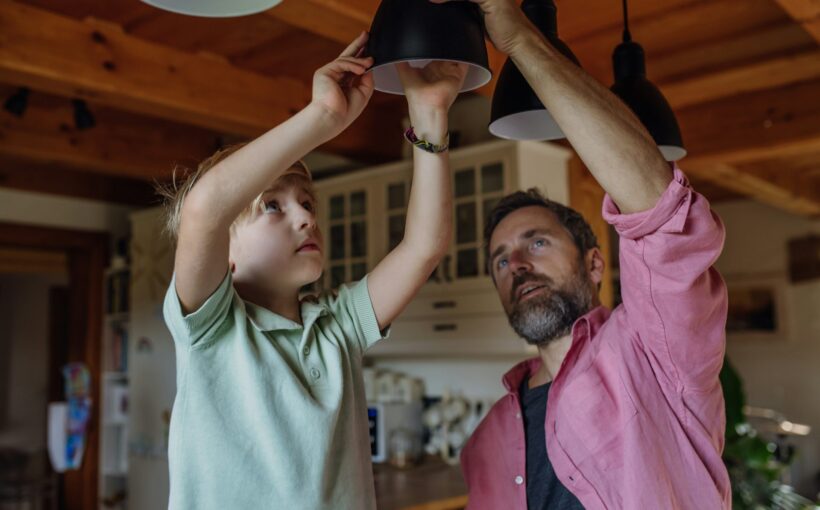
As climate change intensifies, rising public awareness and incremental behavioural changes will hopefully evolve into transformative action. We investigate how lifestyles and systems of governance need to change to bring about a sustainable, low-carbon future in the UK.
Our research at the Centre for Climate Change and Social Transformations suggests that, among the UK public, there have been significant improvements in climate change knowledge, attitudes and behaviour over the past decade. Recycling rates are rising, energy use is falling, and polling shows that more voters factor climate change into their choice of which party to vote for.
In a recent scientific paper, we reviewed over 240 academic studies to summarise the ways in which people can act in their different roles to take action on climate change. Then we compared surveys from 2008 and 2022 which asked the British public about their knowledge of climate change, their attitudes towards it, and their consumer choices. We call the knowledge, skills and motivation necessary to reduce a person’s carbon footprint their “carbon capability”.
In 2008, 66% of respondents reported knowing “a fair amount” or “a lot” about climate change; this increased to 80% in 2022. Over the same period, the proportion of respondents who said they were familiar with the term “carbon footprint” increased from 51% to 68%. We also found that a large majority (81%) of UK citizens agree that “significant lifestyle changes” are required to meet climate goals.

More engaged at home and in shops
Energy conservation in homes has seen notable improvements. The percentage of people who say they regularly switch off lights in empty rooms, for example, increased from 67.2% in 2008 to 73.3% in 2022.
And the proportion of people who report regularly buying organic, locally produced and in-season food increased from 12.6% to 19.2%. The popularity of meat-eating is strongly influenced by demographic factors, and we found that younger, more educated and left-leaning people were more willing to reduce red meat in their diet.
Recycling rates have also improved since 2008, rising from just over 70% to nearly 78% of people who say they recycle at home. In 2022, nearly 25% said they often buy products with less packaging, compared with only 11% in 2008. Younger people and parents are significantly more likely to buy second-hand, repair or repurpose items.

One action to boost the carbon capability of the whole population is to talk about climate change. Around two-thirds (64%) of people surveyed in 2022 said they had held a conversation about climate change in the last month, and again we found that younger, more educated and wealthier people were the most likely to do this.
There has been a notable increase in the practice of writing to politicians about climate issues (4.9% in 2022, up from 0.4%), which may be attributed to the greater ease of doing so – using email templates and online petitions, for example. This is consistent with evidence that UK politicians have experienced substantial increases in overall correspondence in recent years, especially during the pandemic.
Bigger and harder changes needed
Despite people reporting they had stepped up their efforts to save energy in the home, more impactful measures like installing heat pumps continue to lag. Structural barriers, particularly related to housing tenure, prevent many from pursuing energy-efficiency measures. For example, private and social renters may be more restricted from making these improvements, compared with homeowners.
The percentage of those saying they fly less often as a result of climate change fell slightly, from 23.8% in 2008 to 21.7% in 2022. However, six in ten people said they would like to travel more in the latest survey. Although there has been a notable increase in remote working in recent years, this hasn’t amounted to an overall reduction in transport-related emissions in the UK population.

There is increased interest in sustainable food choices, and meat consumption is declining in the UK. However, our research shows the proportion of vegetarians and vegans remains relatively low at 7.7%, and has actually fallen by one percentage point since 2008 – although estimates of vegetarianism do vary among different studies.
Our findings also show that people substantially underestimate their food waste. According to food waste charity Wrap, UK households generate an average of 241kg of food waste a year – equating to 16% of all food purchased. However, 91% of our survey respondents in 2022 thought their food waste amounts to less than 10% of what they purchase.
There does appear to be a growing awareness and commitment to reducing carbon footprints among the UK public. Younger, more educated and wealthier people tend to be most engaged and more capable of changing their lifestyles. This shows how important it will be for any climate solution to address socio-economic disparities.
The progress achieved so far is commendable, but incremental changes in everyday habits, like switching off lights and recycling, have progressed further than more effective changes like the installation of low-carbon heating systems or significant alterations to diets. To address the full scope of environmental challenges, more widespread lifestyle changes are needed.
Measures designed to nudge people into making better climate choices have tended to be preferred by policymakers. If we are serious about making the UK more carbon capable, we need to see more substantive measures, such as removing barriers to make low-carbon life choices easy, affordable and attractive.
Sam Hampton receives funding from the Economic and Social Research Council.
Lorraine Whitmarsh receives funding from the Economic and Social Research Council.



